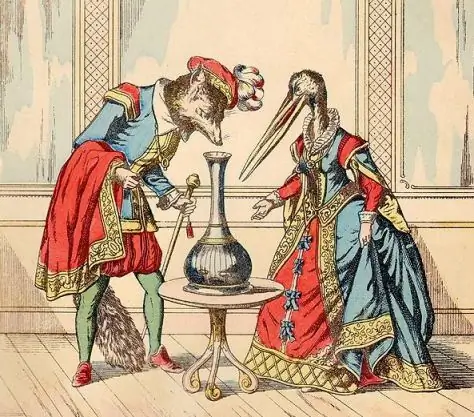- Author Antonio Harrison harrison@cultureoeuvre.com.
- Public 2023-12-16 07:44.
- Last modified 2025-01-22 21:44.
Jean de La Fontaine is a famous French fabulist. He ridiculed human vices and shortcomings, and especially the customs of the court of Louis the Great. The fables he wrote were a great success among his contemporaries.

early years
Jean de La Fontaine was born in 1621 in Château-Thierry in the French Champagne region. At the age of 20, he was preparing for the clergy, he wanted to take monastic vows. However, at the insistence of his father, he did not do this and married a girl who at that time was only 14 years old. La Fontaine did not like her and throughout his life he was cold, like children.
He later moved to Paris and became involved in law. His father served as a caretaker in the forestry department. In 1647 La Fontaine inherited this position. However, he soon found himself in a completely different business - writing fables.

Like most writers, La Fontaine dabbled in different genres. He revised the composition of Terence and wrote the comedy "Eunuch" in 1654. It became Lafontaine's first published work. In 1658, under the influence of the works of Ovid and Virgil, he composed the poem "Adonis", and four years later - two odes.
In classical French literature, the question has repeatedly arisen whether it is necessary to follow the ideals of ancient authors - the famous "dispute between the ancients and the new." La Fontaine sided with the latter. His fables and funny tales have completely renewed both literary genres, in particular thanks to the author's skill in deducing difficult morals. La Fontaine borrowed the plot from ancient authors, but his attitude to actions and heroes was different. This approach brought him wide fame during his lifetime.
Creation
La Fontaine looked to the ancient authors Aesop and Phaedrus for inspiration. In addition, he used plots from the ancient Indian Panchatantra and the writings of Italian writers from the Renaissance.

La Fontaine completely renewed the genre of the fable: he changed the style, made one of two fables, introduced new structures. He also made the story more dynamic, removed all kinds of digressions, added situations and characters, and ignored the details that slowed down the story. Thanks to this, La Fontaine's fables were distinguished by their liveliness.
In his fables, he did not insist that man should be pious. La Fontaine was simply describing the prevailing habits and behavior in 17th century society. For this he was accused of "immoral morality." Despite this, the fables were reprinted several times during his lifetime.
Ivan Krylov translated the works of La Fontaine into Russian at the beginning of the 19th century. He brought the subjects closer to the realities of Russian life, and the fables quickly gained popularity.
Among the famous fables of La Fontaine: "Fox and Crane", "Lion and Mouse", "Rat and Oyster", "Bear and Two Hunters".

Two years before his death, La Fontaine publicly confessed and renounced his works. At that time he was already seriously ill.






